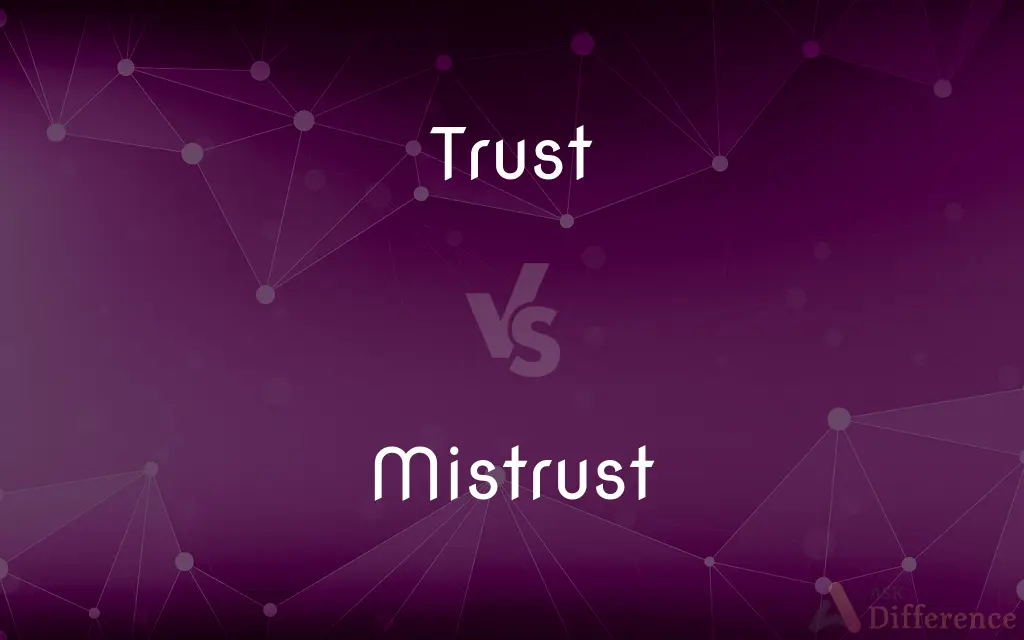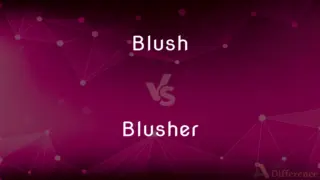Trust vs. Mistrust — What's the Difference?
Edited by Tayyaba Rehman — By Fiza Rafique — Updated on October 12, 2023
Trust is the belief in the reliability of someone or something; Mistrust is the lack of such belief or suspicion toward reliability.

Difference Between Trust and Mistrust
Table of Contents
ADVERTISEMENT
Key Differences
Trust and Mistrust represent opposite ends of the belief spectrum. Trust is a positive emotion, one that involves believing in the integrity, strength, or ability of another person or entity. It's built over time and is often the foundation of many relationships, both personal and professional. Mistrust, conversely, is a feeling of doubt about someone's honesty or reliability. It signifies a lack of confidence in someone or something and can stem from past experiences or perceived intentions.
Trust is something that's earned, nurtured, and valued in relationships. It's seen as a cornerstone of a healthy relationship. Without trust, bonds can become fragile, and interactions can be tinged with doubt. Mistrust, meanwhile, introduces skepticism and caution into a relationship, making interactions guarded and often tense.
When you trust someone, you believe in their words and actions, expecting them to act in your best interest or fulfill promises. This belief is founded on experiences, mutual respect, and understanding. Mistrust is the absence or erosion of this belief. It’s a protective stance, taken when there are fears of deceit or harm.
It’s also worth noting that while trust can be broken, it can also be rebuilt over time with effort, understanding, and transparency. Mistrust can be a temporary state, changing with time and experiences, or it can become a longstanding feeling, deeply affecting interactions and perceptions.
In various societal and individual contexts, the balance between Trust and Mistrust determines the fluidity of interactions. High levels of trust often lead to cooperative and progressive environments, while pervasive mistrust can hamper growth and collaboration.
ADVERTISEMENT
Comparison Chart
Definition
Belief in reliability.
Doubt or suspicion of reliability.
Nature
Positive emotion.
Negative emotion.
Effect on Relationships
Strengthens bonds.
Weakens or strains bonds.
Origin
Built over time, positive experiences.
Stemming from doubt, past betrayals.
Changeability
Can be rebuilt.
Can transition to trust with positive experiences.
Compare with Definitions
Trust
Dependence on something's reliability.
People have trust in the banking system.
Mistrust
Doubt about someone's honesty.
Mistrust grew as he continued to avoid the truth.
Trust
A legal entity for holding assets.
He set up a trust for his children.
Mistrust
Lack of confidence in someone.
His actions caused her to feel mistrust.
Trust
Hope or expectation.
They put their trust in a better future.
Mistrust
Reluctance to believe.
The community's mistrust of outsiders was evident.
Trust
Firm belief in the integrity, ability, or character of a person or thing; confidence or reliance
Trying to gain our clients' trust.
Taking it on trust that our friend is telling the truth.
Mistrust
Be suspicious of; have no confidence in
She had no cause to mistrust him
Trust
The condition and resulting obligation of having confidence placed in one
Violated a public trust.
Mistrust
Lack of trust; suspicion
The public mistrust of government
Trust
One in which confidence is placed.
Mistrust
Lack of trust or confidence
I viewed the stranger's advice with mistrust.
Trust
Custody; care
Left her papers in my trust during her illness.
Mistrust
To regard without trust or confidence
He mistrusted his lieutenant.
Trust
Something committed into the care of another; a charge
Violated a public trust.
Mistrust
To doubt the truth or sincerity of
I mistrust everything he says.
Trust
Reliance on something in the future; hope
We have trust that the future will be better.
Mistrust
Lack of trust or confidence; distrust, untrust.
Trust
Reliance on the intention and ability of a purchaser to pay in the future; credit
Bought the supplies on trust from a local dealer.
Mistrust
(transitive) To have no confidence in (something or someone).
Trust
A legal relationship in which one party holds a title to property while another party has the entitlement to the beneficial use of that property.
Mistrust
(transitive) To be wary, suspicious or doubtful of (something or someone).
Trust
The confidence reposed in a trustee when giving the trustee legal title to property to administer for another, together with the trustee's obligation regarding that property and the beneficiary.
Mistrust
(transitive) To suspect, to imagine or suppose (something) to be the case.
Trust
The property so held.
Mistrust
(intransitive) To be suspicious.
Trust
An institution or organization directed by trustees
A charitable trust.
Mistrust
Want of confidence or trust; suspicion; distrust.
Trust
A combination of firms or corporations for the purpose of reducing competition and controlling prices throughout a business or industry.
Mistrust
To regard with jealousy or suspicion; to suspect; to doubt the integrity of; to distrust.
I will never mistrust my wife again.
Trust
To have or place confidence in; depend on
Only trusted his friends.
Did not trust the strength of the thin rope.
Could not be trusted to oversee so much money.
Mistrust
To forebode as near, or likely to occur; to surmise.
By a divine instinct, men's minds mistrustEnsuing dangers.
Trust
To have confidence in allowing (someone) to use, know, or look after something
Can I trust you with a secret?.
Mistrust
Doubt about someone's honesty
Trust
To expect with assurance; assume
I trust that you will be on time.
Mistrust
The trait of not trusting others
Trust
To give credence to; believe
I trust what you say.
Mistrust
Regard as untrustworthy; regard with suspicion; have no faith or confidence in
Trust
To place in the care of another person or in a situation deemed safe; entrust
"the unfortunate souls who trusted their retirement savings to the stock" (Bill Barnhart).
Mistrust
The absence of trust.
The betrayal sowed seeds of mistrust.
Trust
To extend credit to.
Mistrust
Suspicion or caution.
She viewed his motives with mistrust.
Trust
To have or place reliance; depend
We can only trust in our guide's knowledge of the terrain.
Trust
To be confident; hope.
Trust
Confidence in or reliance on some person or quality.
He needs to regain her trust if he is ever going to win her back.
To lose trust in someone
Build up trust
A relationship built on mutual trust
Trust
Dependence upon something in the future; hope.
Trust
Confidence in the future payment for goods or services supplied; credit.
I was out of cash, but the landlady let me have it on trust.
Trust
That which is committed or entrusted; something received in confidence; a charge.
Trust
That upon which confidence is reposed; ground of reliance; hope.
Trust
(rare) Trustworthiness, reliability.
Trust
The condition or obligation of one to whom anything is confided; responsible charge or office.
Trust
(legal) The confidence vested in a person who has legal ownership of a property to manage for the benefit of another.
I put the house into my sister's trust.
Trust
(legal) An arrangement whereby property or money is given to be held by a third party (a trustee), on the basis that it will be managed for the benefit of, or eventually transferred to, a stated beneficiary; for example, money to be given to a child when he or she reaches adulthood.
Trust
A group of businessmen or traders organised for mutual benefit to produce and distribute specific commodities or services, and managed by a central body of trustees.
Trust
(computing) Affirmation of the access rights of a user of a computer system.
Trust
(transitive) To place confidence in, to rely on, to confide in.
We cannot trust anyone who deceives us.
Trust
To have faith in; to rely on for continuing support or aid.
Trust
(transitive) To give credence to; to believe; to credit.
Trust
(transitive) To hope confidently; to believe (usually with a phrase or infinitive clause as the object)
I trust you have cleaned your room?
Trust
(transitive) to show confidence in a person by entrusting them with something.
Trust
(transitive) To commit, as to one's care; to entrust.
Trust
(transitive) To give credit to; to sell to upon credit, or in confidence of future payment.
Merchants and manufacturers trust their customers annually with goods.
Trust
To rely on (something), as though having trust (on it).
To trust to luck
Having lost the book, he had to trust to his memory for further details.
Trust
To risk; to venture confidently.
Trust
(intransitive) To have trust; to be credulous; to be won to confidence; to confide.
Trust
To sell or deliver anything in reliance upon a promise of payment; to give credit.
Trust
(obsolete) Secure, safe.
Trust
(obsolete) Faithful, dependable.
Trust
(legal) of or relating to a trust.
Trust
Assured resting of the mind on the integrity, veracity, justice, friendship, or other sound principle, of another person; confidence; reliance; reliance.
Most take things upon trust.
Trust
Credit given; especially, delivery of property or merchandise in reliance upon future payment; exchange without immediate receipt of an equivalent; as, to sell or buy goods on trust.
Trust
Assured anticipation; dependence upon something future or contingent, as if present or actual; hope; belief.
His trust was with the Eternal to be deemedEqual in strength.
Trust
That which is committed or intrusted to one; something received in confidence; charge; deposit.
Trust
The condition or obligation of one to whom anything is confided; responsible charge or office.
[I] serve him truly that will put me in trust.
Reward them well, if they observe their trust.
Trust
That upon which confidence is reposed; ground of reliance; hope.
O Lord God, thou art my trust from my youth.
Trust
An estate devised or granted in confidence that the devisee or grantee shall convey it, or dispose of the profits, at the will, or for the benefit, of another; an estate held for the use of another; a confidence respecting property reposed in one person, who is termed the trustee, for the benefit of another, who is called the cestui que trust.
Trust
An equitable right or interest in property distinct from the legal ownership thereof; a use (as it existed before the Statute of Uses); also, a property interest held by one person for the benefit of another. Trusts are active, or special, express, implied, constructive, etc. In a passive trust the trustee simply has title to the trust property, while its control and management are in the beneficiary.
Trust
A business organization or combination consisting of a number of firms or corporations operating, and often united, under an agreement creating a trust (in sense 1), esp. one formed mainly for the purpose of regulating the supply and price of commodities, etc.; often, opprobriously, a combination formed for the purpose of controlling or monopolizing a trade, industry, or business, by doing acts in restraint or trade; as, a sugar trust. A trust may take the form of a corporation or of a body of persons or corporations acting together by mutual arrangement, as under a contract or a so-called gentlemen's agreement. When it consists of corporations it may be effected by putting a majority of their stock either in the hands of a board of trustees (whence the name trust for the combination) or by transferring a majority to a holding company. The advantages of a trust are partly due to the economies made possible in carrying on a large business, as well as the doing away with competition. In the United States severe statutes against trusts have been passed by the Federal government and in many States, with elaborate statutory definitions.
Trust
Held in trust; as, trust property; trustmoney.
Trust
To place confidence in; to rely on, to confide, or repose faith, in; as, we can not trust those who have deceived us.
I will never trust his word after.
He that trusts every one without reserve will at last be deceived.
Trust
To give credence to; to believe; to credit.
Trust me, you look well.
Trust
To hope confidently; to believe; - usually with a phrase or infinitive clause as the object.
I trust to come unto you, and speak face to face.
We trustwe have a good conscience.
Trust
To show confidence in a person by intrusting (him) with something.
Whom, with your power and fortune, sir, you trust,Now to suspect is vain.
Trust
To commit, as to one's care; to intrust.
Merchants were not willing to trust precious cargoes to any custody but that of a man-of-war.
Trust
To give credit to; to sell to upon credit, or in confidence of future payment; as, merchants and manufacturers trust their customers annually with goods.
Trust
To risk; to venture confidently.
[Beguiled] by theeto trust thee from my side.
Trust
To have trust; to be credulous; to be won to confidence; to confide.
More to know could not be more to trust.
Trust
To be confident, as of something future; to hope.
I will trust and not be afraid.
Trust
To sell or deliver anything in reliance upon a promise of payment; to give credit.
It is happier sometimes to be cheated than not to trust.
Her widening streets on new foundations trust.
They trusted unto the liers in wait.
Trust
Something (as property) held by one party (the trustee) for the benefit of another (the beneficiary);
He is the beneficiary of a generous trust set up by his father
Trust
Certainty based on past experience;
He wrote the paper with considerable reliance on the work of other scientists
He put more trust in his own two legs than in the gun
Trust
The trait of trusting; of believing in the honesty and reliability of others;
The experience destroyed his trust and personal dignity
Trust
A consortium of independent organizations formed to limit competition by controlling the production and distribution of a product or service;
They set up the trust in the hope of gaining a monopoly
Trust
Complete confidence in a person or plan etc;
He cherished the faith of a good woman
The doctor-patient relationship is based on trust
Trust
A trustful relationship;
He took me into his confidence
He betrayed their trust
Trust
Have confidence or faith in;
We can trust in God
Rely on your friends
Bank on your good education
I swear by my grandmother's recipes
Trust
Allow without fear
Trust
Be confident about something;
I believe that he will come back from the war
Trust
Expect and wish;
I trust you will behave better from now on
I hope she understands that she cannot expect a raise
Trust
Confer a trust upon;
The messenger was entrusted with the general's secret
I commit my soul to God
Trust
Extend credit to
Trust
Confidence in someone's honesty.
She placed her trust in him.
Trust
The responsibility of taking care of something.
The property is held in trust for her daughter.
Common Curiosities
Is Trust always beneficial?
Mostly, but blind trust without discernment can be detrimental.
Are Trust and Mistrust opposites?
Yes, Trust is belief in reliability, while Mistrust is suspicion or doubt of that reliability.
Can Mistrust be overcome?
Yes, with open communication, understanding, and consistent trustworthy actions.
Can Mistrust be protective?
Yes, it can prevent one from being misled or hurt in uncertain situations.
How can I rebuild broken Trust?
Apologize sincerely, understand the reasons, act consistently, and give it time.
How is Trust built?
Trust is built over time through positive experiences, transparency, and consistency.
Is it harder to earn Trust or overcome Mistrust?
Often, it's harder to overcome Mistrust as it stems from broken trust or negative experiences.
Are Trust and faith the same?
They're similar, but trust is often based on evidence and experience, while faith might not require empirical evidence.
What's the relationship between Trust and vulnerability?
Trusting someone often involves making oneself vulnerable, hoping they won't take advantage.
Can Trust and Mistrust coexist?
It's possible to trust certain aspects of a person or thing and mistrust others.
Why is Mistrust considered negative?
It introduces doubt and skepticism, which can strain relationships.
Can Trust be given immediately?
It varies by individual; some give trust easily, while others require time and proof.
Share Your Discovery

Previous Comparison
Matryoshka vs. Babushka
Next Comparison
Blush vs. BlusherAuthor Spotlight
Written by
Fiza RafiqueFiza Rafique is a skilled content writer at AskDifference.com, where she meticulously refines and enhances written pieces. Drawing from her vast editorial expertise, Fiza ensures clarity, accuracy, and precision in every article. Passionate about language, she continually seeks to elevate the quality of content for readers worldwide.
Edited by
Tayyaba RehmanTayyaba Rehman is a distinguished writer, currently serving as a primary contributor to askdifference.com. As a researcher in semantics and etymology, Tayyaba's passion for the complexity of languages and their distinctions has found a perfect home on the platform. Tayyaba delves into the intricacies of language, distinguishing between commonly confused words and phrases, thereby providing clarity for readers worldwide.
















































